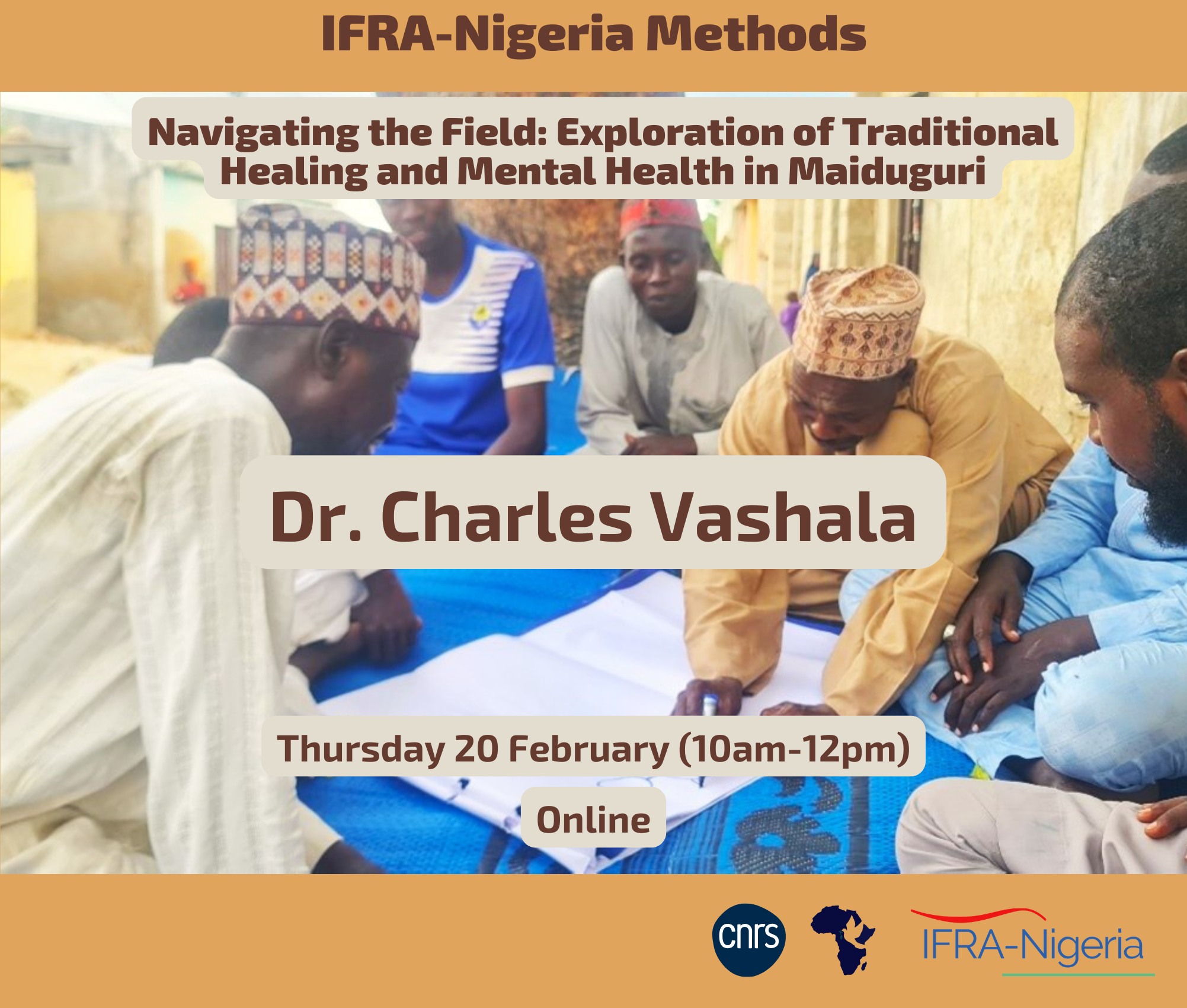Methodological Seminar - Navigating the field - Charles Vashala
 On 20 February, IFRA-Nigeria held a Methodological Seminar with Charles Vashala, researcher at the Center for the Study and Promotion of Cultural Sustainability of the University of Maiduguri and Cotutal doctoral candidate in Maiduguri and at the University of Hildesheim (Germany). He is also the recipient of an IFRA research grant. He presented the innovative methods he used for his research on the "Exploration of Traditional Healing and Mental Health in Maiduguri".
On 20 February, IFRA-Nigeria held a Methodological Seminar with Charles Vashala, researcher at the Center for the Study and Promotion of Cultural Sustainability of the University of Maiduguri and Cotutal doctoral candidate in Maiduguri and at the University of Hildesheim (Germany). He is also the recipient of an IFRA research grant. He presented the innovative methods he used for his research on the "Exploration of Traditional Healing and Mental Health in Maiduguri".
He began his presentation by presenting his research project and his goal to see it being used to bring about better policies on mental health in Borno state. He reflected on the specific challenges of access and trust while conducting research in a dangerous environment. He explained the importance of the use of partners to work around it, and the ethical challenges of needing to adapt to local beliefs and cultural practices. Finally, he explained his innovative methodology : participatory methods through drawing. A Q&A session followed the presentation.
You can find a summary of Mr. Vashala's presentation below!
Mr. Vashala began by presenting his research: looking at the traditional practices, modern healthcare methods and mental health in the context of the Boko Haram insurgency, he hopes to provide practical policy advice that could benefit Borno state, and even Nigeria at large. He reflected on his fieldwork experience in particular, recognizing that many of his initial assumptions were shaken by the actual experience in the field. In particular, accessing the participants proved to be difficult, and he found people tended to be initially skeptical of his work.
He talked about the particular struggles of conducting research in a conflict affected zone, namely the added layer of mistrust from the population, the need to obtain a number of clearances from government offices and restrictions on areas where research can be conducted. He offered a few solutions for those interested in pursuing research in similar contexts. First, he emphasized the crucial importance of partnerships, and his use of "gatekeepers", trusted actors known by the community, to gain access. He relied for this task on NGOs, which opened doors to him but also created expectations of aid from the population, which he then was forced to manage. Moreover, he added that patience is extremely important in a research context marked by fear like this one.
Next, he delved into the ethical challenges related to his research. Specifically, he mentioned the challenge of fitting in the cultural norms of the inhabitants in order to be able to conduct their research. This included separating the interviewers and interviewees by gender, and dressing in a way that is considered appropriate to the local community. Adapting to cultural beliefs and practices also meant using an adapted vocabulary regarding mental health, as well as showing respect for the community's beliefs, even when you do not share them.
Language by enlarge was a major part of the study, as most of the interviews were conducted in Hausa, which most of them could speak, or in Kanuri, from which they needed to hire a translator. Similarly a number of interviewees had a low literacy level, which they needed to work around, including regarding the question of receiving consent. Indeed, in a research project such as this, the ethical question of consent is paramount, as they are dealing with particularly traumatizing experiences. Charles Vashala mentioned the emphasis they put on avoiding as much as possible any further emotional distress, and how to deal with it when it occurred.
In his fieldwork, Mr. Vashala used several methods of data gathering, such as ethnographic immersion through the participation in the healing rituals, interviews and focus groups which he needed to adapt to the participants' comfort level. Most of all, he focused on innovative participatory methods, which seek to actively integrate the participants, stressing collaboration and shared knowledge over all else. This can take many forms, such as asking the participants to take pictures and to narrate them (photovoice), or walking through locations and gathering their impressions (transect walk). Charles Vashala shared some of the drawings the participants made as part of the participatory sessions, as well as the participants' own thoughts on their creations.
The presentation was followed by a stimulating Q&A sessions, where participants got to ask Charles Vashala on questions like the relation between Islam and traditional healing, the gendered aspect of the impact on mental health, the prompts he used for the drawings, dealing with the emotional reaction of the interviewees and whether the conduct regarding dress is more a cultural or religious practice.

Social Media
Mailing List